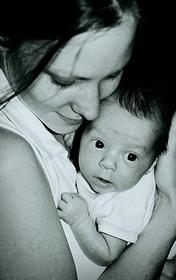How long is postpartum considered? Read more about treating postnatal depression. Spotting the signs in others. Postnatal depression can develop gradually and it can be hard to recognise.
Postpartum depression symptoms. If you have some of the early warning signs of postpartum depression , talk to your doctor or counselor right away. The earlier you seek treatment, the sooner you can start to feel like yourself again.
The severity of postnatal anxiety and depression depends on the number of symptoms , their intensity and the extent to which they interfere with getting on with day-to-day life. The baby blues can make you feel moody, weepy and anxious, but it usually gets better within a few hours, or days, after the birth. If these feelings go beyond the first two weeks after your baby is born, you may have PND. Symptoms of postnatal depression may start as baby blues and then get worse.
Signs of postpartum depression are generally present for more than two weeks. Our expert explains what support and treatments are available if you think you have the illness. Men can also develop a type of postpartum depression , called paternal postnatal depression.
Some of the main signs and symptoms of PND are listed below. Medical negligence can cause postnatal depression , but it can happen during any birth – even if no negligence was present. What Is Postnatal Depression ? There may also be physical symptoms such as headaches and rapid heart rate. While being a parent can be a hugely satisfying experience, it can also be tough and there are many pressures on mums and dads to be ‘perfect’. With postpartum depression , feelings of sadness and anxiety can be extreme and might interfere with a woman’s ability to care for herself or her family.

Mothers with postpartum depression experience feelings of. Symptoms include a feeling of being overwhelme frequent crying, and fatigue. According to the Centers for Disease Control and Prevention (CDC), up to percent of new mothers experience one or more symptoms of postpartum depression. Consult your doctor if you feel the symptoms increasing in intensity.
Here some common symptoms apart from the above that can help you detect a case of postpartum depression. If you have given birth in the last months, and are experiencing even a few of the below symptoms , it could be PPD. Depression that occurs within months of childbirth may be postpartum depression.
.jpg)
In rare cases, a woman may develop postpartum psychosis. This is a very serious disease. It includes all the symptoms of postpartum depression , as well as thoughts of hurting yourself or hurting the baby.
Often we’re too busy to notice our friends might be suffering postnatal depression , but it’s important you know the symptoms because left untreated or unidentified it can cause mums to experience thoughts and behaviours that present a risk to her or her baby. When you read the two different symptoms lists below, one for postpartum depression and the one after it for postpartum anxiety and OC please remember a few very important things: You may not be experiencing all of the symptoms listed below or even most of them. Some women experience rare but extreme cases of the condition known as postpartum psychosis.

On the other han some women experience a milder and more short-term type called “baby blues”. PPND often goes undiagnosed because of the fact that men often show different symptoms as opposed to classic depression. Continued Be Kind to Yourself.
Remember, postpartum depression is a medical condition. It has nothing to do with your character, how good a mother you are, or how much you love your baby. Between and percent of all new mothers reportedly suffer from postnatal depression. Common symptoms of postnatal depression include fluctuations in moo mood changes, suicidal ideation and preoccupation with infant well‐being ranging from over‐concern to frank delusions. There is currently not much evidence regarding interventions that might prevent or treat postnatal depression.
Antenatal and postnatal depression are together known as perinatal depression. The symptoms of antenatal and postnatal depression depend on the severity of the depression , but may include low self-esteem, feelings of inadequacy and guilt, tearfulness, sleeping difficulties and panic attacks. Men and women can experience depression very differently.
No comments:
Post a Comment
Note: Only a member of this blog may post a comment.